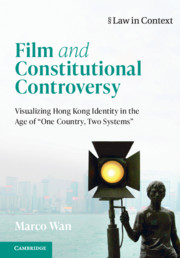 Film and Constitutional Controversy
Film and Constitutional Controversy Ng See-yuen’s The Unwritten Law
Published online by Cambridge University Press: 05 February 2021
The Sino-British Joint Declaration, signed between the Chinese and British governments in 1984, set an official date of July 1, 1997 for China’s resumption of sovereignty over Hong Kong. Many people in the colony had mixed emotions about the prospect of the handover: The idea of an end to British colonization was a source of national pride, but at the same time the thought of being taken over by a communist state was a cause of great apprehension. In the wake of the Declaration, officials from China intensified their calls on Hong Kongers to “love the motherland.” What did it mean to be told to “love the motherland,” and how can such love be represented in cinematic terms? I posit that Ng See-Yuen’s The Unwritten Law (1985; 法外情) gives visual form to the love between “the motherland” and Hong Kong by allegorizing it as the love between mother and son. I will further contend that Ng’s film, appearing at the moment when decolonization became a certainty, takes part in a critical reflection of the extent to which justice was upheld under the colonial authorities.
To save this book to your Kindle, first ensure no-reply@cambridge.org is added to your Approved Personal Document E-mail List under your Personal Document Settings on the Manage Your Content and Devices page of your Amazon account. Then enter the ‘name’ part of your Kindle email address below. Find out more about saving to your Kindle.
Note you can select to save to either the @free.kindle.com or @kindle.com variations. ‘@free.kindle.com’ emails are free but can only be saved to your device when it is connected to wi-fi. ‘@kindle.com’ emails can be delivered even when you are not connected to wi-fi, but note that service fees apply.
Find out more about the Kindle Personal Document Service.
To save content items to your account, please confirm that you agree to abide by our usage policies. If this is the first time you use this feature, you will be asked to authorise Cambridge Core to connect with your account. Find out more about saving content to Dropbox.
To save content items to your account, please confirm that you agree to abide by our usage policies. If this is the first time you use this feature, you will be asked to authorise Cambridge Core to connect with your account. Find out more about saving content to Google Drive.